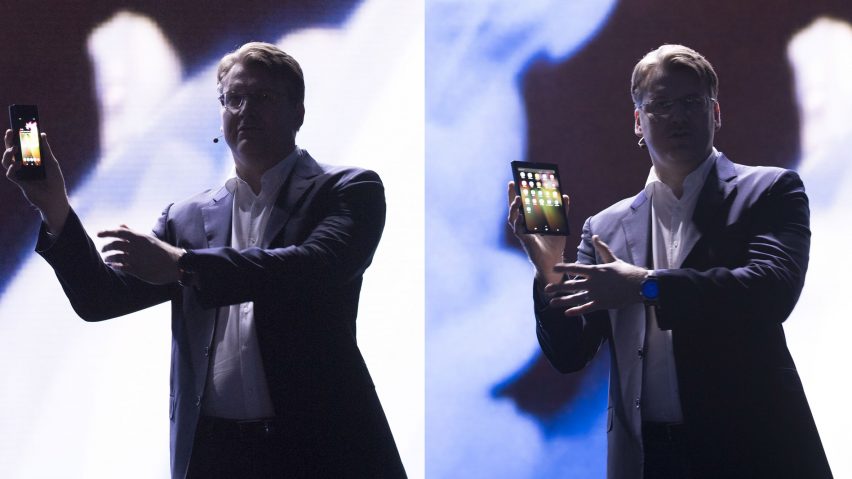This week on Dezeen a prototype smartphone that unfolds into a tablet was revealed by Samsung, and researchers debuted bio-bricks made with urine.
Samsung announced the Infinity Flex, a phone that folds out to become a wider touch screen, at a conference in San Francisco.
The foldable Android phone flips open at the side like a book to become a tablet. Commentators said the new development could bring the "wow factor" back to technology.
Cape Town university researcher Suzanne Lambert has created a building material made from human urine, sand and bacteria. The bricks harden at room temperature, in a chemical reaction similar to the way seashells are formed.
Lambert said she hopes her microbial carbonate precipitation method could be a sustainable alternative to traditional bricks, which have to be fired at temperatures of 1,000 degrees Celsius.
Roger Scruton's naming as chair of the UK government's new housing commission caused a backlash from British architects. They said the philosopher's appointment was an attempt by the Conservative party to re-ignite the argument between traditional and modern architecture.
Labour MPs are calling on him to be sacked for his alleged antisemitic and homophobic statements.
A cryptocurrency millionaire is planning to build a smart city powered by blockchain in the Nevada desert. Jefferey Berns wants to develop Innovation Park to pioneer blockchain's use in urban environments, so residents could buy, vote and store data using the technology.
Meanwhile Amazon is planning to split its second major US headquarters between New York and Virginia. The retail giant is reported to be looking at sites for its HQ2 bases in Long Island City in Queens and Crystal City, near Washington DC.
In architecture news SHoP has changed its designs for a department store and skyscraper in Detroit. The New York firm has increased the tower's height from 224 to 278 metres and made the shape stepped rather than straight.
Wilkinson Eyre has unveiled visuals of their plans for Lords Cricket Grounds in London. The pair of three-teir stands for the stadium will sit either side of Future Systems Stirling Prize-winning media centre.
A system that can create clean drinking water by creating artificial clouds in a shipping container was featured on Dezeen. US architect David Hertz has lead the design team for WEDEW, which can create 2,000 litres a day and is easily transportable.
A team of designers also created a searchable database of candidate's campaign logos, just in time for the midterm elections in the US.
Tadao Ando's Chicago exhibition space was a popular project this week, as was Le Corbusier's refurbished Paris flat and a shed-like guest house by Atelier Pierre Thibault.

